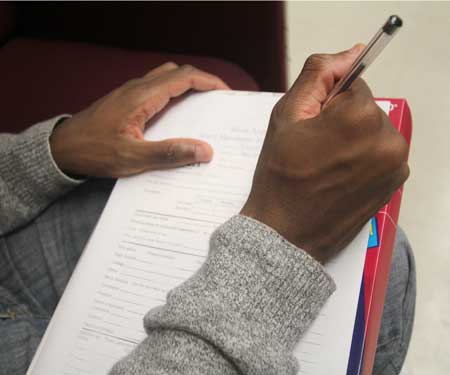By Jorashae Graddick
NCCU Staff Writer
the Durham VOICE
thedurhamvoice@gmail.com
According to The NC Justice Center website, 1.6 million North Carolinians have criminal records. Currently the prison population is 40,000 of those 98 percent of those inmates are expected to be released. But 50 percent of them are likely to return on new charges.

NCCU’s Law School and UNC’s School of Government hosted a program focused on understanding the collateral consequences of criminal convictions and introducing the “Ban the Box” movement to the Durham community. (Staff photo by Jorashae Graddick)
The consequences for those with criminal records are real and harsh: difficulty finding a job tops the list. When you can’t get a job because you have a record, it makes it hard to rebuild a life. But, there are people and groups out there to help.
On Sept. 25, at N.C Central University’s Law School, TALIAS (Technology Assisted Legal Instruction and Services) and the UNC School of Government hosted a workshop to talk about these “collateral consequences” and “invisible punishments.”
In addition to explaining the consequences of having a felony conviction, they addressed civil actions underway to get ex-offenders back to work.
Attorney Daryl Atkinson of the Southern Coalition for Social Justice discussed the Collateral Consequences Assessment Tool (C-CAT) found on the UNC School of Government website.
This interactive tool might be useful for people working with at-risk youth to teach them about the consequences of a felony on all sorts of jobs and societal roles.
The website is free and open to the public, only requiring visitors to fill out a brief form for subscription. It provides a detailed list of professions as well as employment licenses that can be affected by criminal activity.
Attorney Whitney Fairbanks, Civil Defender Educator at UNC School of Government highlighted the various solutions to removing criminal records or getting rid of collateral consequences.
According to the North Carolina laws, a person who has a criminal conviction but who has served his or her sentence is automatically restored the right to vote, right to sit on a jury, as well as running for some public offices.
However, according to Fairbanks, “It doesn’t affect many other collateral consequences.”
Another option a convicted felon has is to seek expungement of the record: basically to have the criminal conviction erased.
A step below this is to seek a Certificate of Relief. “This relieves some collateral consequences,” say Fairbanks. For some licensed jobs, having a conviction means that you are no longer eligible for a license. The Certificate of Relief can restore your ability to get a license for these jobs.
This option is only available to people convicted of misdemeanors or minor felonies.
The last options, which are very rare, are pardons, innocence determinations and Motions for Appropriate Relief (MARs).
However, in attempt to make finding employment easier and less discriminatory, a civil solution to these invisible punishments has been to implement the “Ban the Box” initiative.
Ban the Box is a movement to take away the box on employment applications that indicate a criminal record. This encourages more face-to-face interviews.
Both the City of Durham and Durham County have banned the box on their government application.
With this, the question, “Have you ever been convicted of a felony?” is removed from the application.
Atkinson states that it gives the person seeking employment three rights after they are considered for a job: “Check accuracy, explain circumstances surrounding the conviction, and to show evidence of rehabilitation.”
However, Atkinson emphatically reinforces that a background check is still done. But with the movement, it supports the idea that if people who have convictions find jobs it will save them from returning to jail.
“Create a personal narrative or portfolio to submit with all applications, so that employers don’t just see you as a check in a box,” was Atkinson’s advice.
Also when referring to those who seek career placement, he suggests speaking to a lawyer to decide what the best option is for you.
For more information about legal advice on relief mechanisms, contact the NC Central School of Law Clinics at 919-530-6333 or Legal Aid of NC at 919-856-2564.
NCCU’s law school will be offering other workshops throughout the end of the year. The law school is visible from S. Alston Ave. and the DATA bus 12 can take you there.
UPCOMING EVENTS:
North Carolina Central University School of Law
Turner Law Building
640 Nelson Street
Durham, NC 27707
Registration is encouraged but not required
Michelle Roberts at 919-530-6601
FREE and open to the public
“Register Then Vote”
October 3rd at 6:00pm-7:30pm
BREAKING THE SILENCE SERIES
“Dating Violence”
October 2nd at 6:00pm-7:30pm
“Two Sides of Domestic Violence”
October 23rd at 6:00pm-7:30pm
“Everything You Need to Know About Domestic Violence”
October 30th at 6:00pm-7:15pm
CHILD SUPPORT “It’s More Than Money!” SERIES
“Do you have Questions? We have Answers…” Ask questions that relate to child custody, child support, and divorce.
October 9th at 6:00pm-7:30pm
“Child Support Modification”
October 16th at 6:00pm-7:30pm
“Child Support Show Cause Orders”
November 6th at 6:00pm-7:30pm
Weblinks:
NC Justice Center
“Ban the Box”: For a Second Chance at Fair Employment
http://www.legalaidnc.org/ Legal Aid of NC
http://www.law.nccu.edu/clinics NCCU Law School Clinics
http://ccat.sog.unc.edu/ Collateral Consequences Assessment Tool
Caption:
NCCU’s Law School and UNC’s School of Government hosted a program focused on understanding the collateral consequences of criminal convictions and introducing the “Ban the Box” movement to the Durham community. (Staff photo by Jorashae Graddick)
2 thoughts on “Collateral consequences and civil solutions”
Comments are closed.